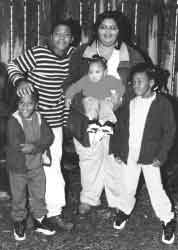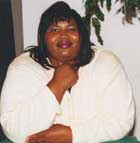
|
 |
She was raised by her grandparents, growing up in a small Alabama town, Putnam, where her grandmother cooked for a white family, and her grampa was a logger. She insists she first learned about racism while battling for justice in courtrooms, learning more during her six-plus years in federal prison about racism in American than the lifetime preceding her arrest. She is Dorothy Gaines, and she was released by President Clinton's order of clemency on December 23, 2000.
Clinton also commuted the sentence of Kemba Smith, a young mother serving 25 years for a drug conspiracy she knew little about. Kemba served 6 years and is able to mother her son for the very first time; she gave birth in shackles not long after her arrest. Both women had law firms supporting their presidential commutation requests as well as organizational exposure from a variety of drug and sentencing reform organizations that assisted in publicizing the obvious injustice in their cases.
 During
our phone interview Dorothy talked about her children: Natasha,
now 26; Phillip, 16; and Chara, 17. Natasha, like many young
victims of the drug war, became parent to her younger brother
and sister. Since her release Phillip has already benefited from
having his mother at home.
During
our phone interview Dorothy talked about her children: Natasha,
now 26; Phillip, 16; and Chara, 17. Natasha, like many young
victims of the drug war, became parent to her younger brother
and sister. Since her release Phillip has already benefited from
having his mother at home.
"He's getting up earlier, showing interest in school and speaking up more," Dorothy said. She described a young boy left withdrawn, 'holding things in' after mom was taken away. "He was not happy with kids teasing him about his mom, and you know, Chuck, he just couldn't concentrate under that stress," she told me.
Her children are no longer innocent, no longer naïve as she feels she was before prison. "My kids are now very aware of how things go in different prisons. They ask more questions and watch things better," said Dorothy. "For me, though, I am very leery, and I have learned not to trust anyone, and I was taught to love growing up in rural Alabama where I don't remember hating or being hated," she continued.
"When and how I got out of prison began
the day I stepped into prison. I asked God to give me knowledge
since I didn't have money. So give me knowledge instead, I prayed.
I soon found that many doors are locked to the prisoner, but
I began writing every day, and I put my faith to work and never
gave up. Unlike many prisoners around me, I determined from the
first day to stand up for something so I wouldn't fall for nothing,"
Dorothy related to me with conviction.
It ought to trouble readers that Dorothy Gaines had to learn
about racism in the courts and prison. "We teach racism
in those systems. I wasn't taught prejudice as a youth, didn't
notice it in Putnam, but after seeing the sentencing disparities,
I began to see it for the first time. Folks ought to teach their
young that all blood is red, there's no white heaven, just one
heaven," she told me.
I asked Dorothy to tell us what she wants everyone to learn from
her experience.
"There are good people in prison. I left many behind, and
we need to support people in prison. If each family, one neighborhood,
one person would reach out to one prisoner, then imagine all
that working, one by one, all across the country. People on the
outside need to open their minds and hearts, find out the whole
story on people, not just get trapped by the words of fear about
criminals and mostly stop being naïve about conspiracy laws."
Dorothy has upcoming appointments with People Magazine, plans
to meet with the Congressional Black Caucus and hopes to thank
President Clinton personally before he leaves office. Dorothy
needs to be online. Is there a reader who can donate funds or
a reliable, user-friendly computer system to Dorothy Gaines in
Mobile, Alabama? She came home only to her children- no clothing
except the red dress brought to the prison for her to wear home-
no job and sharing housing with Natasha and her husband. Please
contact our office if you are able and willing to support this
special request the November Coalition is making on behalf of
Dorothy Gaines who never so much as asked for any personal help
beyond getting her home to her children. If you can help Dorothy
re-establish her life on the outside, email me at: chuck@november.org
or call our office at (509) 684-1550.